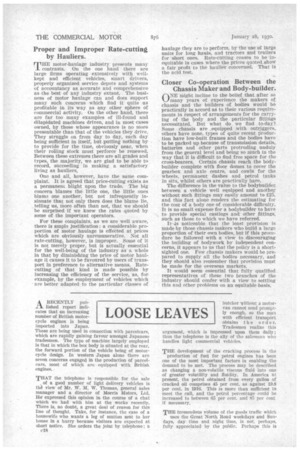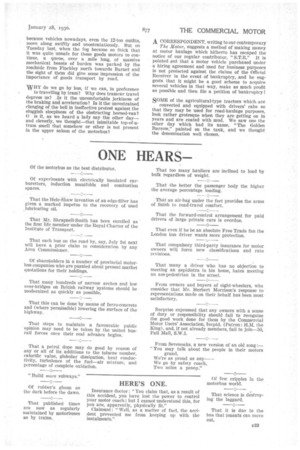LOOSE LEAVES
Page 40

Page 41

If you've noticed an error in this article please click here to report it so we can fix it.
A. RECENTLY published report indicates that an increasing number of British motorcycle engines is being imported into Japan. These are being used in connection with parceicars, which are rapidly gaining favour amongst Japanese tradesmen. The type of machine largely employed is that in which the box body is situated at the rear, the forward portion of the vehicle being of motorcycle design. In western Japan alone there are seven concerns engaged in the production of parcelcars, most of which are • equipped with British engines.
THAT the telephone is responsible for the sale of a good number of light delivery vehicles is tO view of Mr. W. M. W. Thomas, general sales manager and a director of Morris Motors, Ltd. Re' expressed this opinion in the course of a chat which we had with him at the works recently. There is, no doubt, a great deal of reason for this line of thought. Take, for instance, the case of a housewife who wants a leg of mutton sent to her house in a hurry because visitors are expected at short notice. She orders the joint by telephone; a cIS ' butcher 1,51.thout a motorvan cannot send promptly enough, so the mart with efficient transport obtains the order. Tradesmen realize this argument, which is impressed upon them daily ; thus the telephone is the ally of 'the salesman who handles light commercial vehicles.
THE development of the cracking process in the production of fuel for petrol engines has been one of the most important factors in enabling the demand to be met. The process may be described as changing a non-volatile viscous fluid into one of greater volatility and fluidity. In America at present, the petrol obtained from every gallon of cracked oil comprises 45 per cent, as against 19.8 per cent. in 1916. This is more than sufficient to meet the call, and the petrol percentage could be increased to between 65 per cent, and 85 per cent if necessary, THE tremendous volume of the goods traffic which uses the Great North Road weekdays and Sundays, day time and night time, is not, perhaps, fully appreciated by the public. Perhaps this is because vehicles nowadays, even the 12-ton Outfits, move along swiftly and unostentatiously. But on Tuesday last, when the fog became so thick that it was quite unsafe for these goods motors to continue, a queue, over a mile long, of massive mechanical beasts of burden was parked by the roadside from Finchley north towards Barnet and the sight of them did give some impression of the importance of goods transport by road.
WHY do we go by bus, if we can, in preference to travelling by tram? Why does tramcar travel depress us? Is it the uncomfortable jerkiness of the braking and acceleration? Is it the unrestrained clanging of the bell in ineffective protest against the sluggish sleepiness of the obstructing horsed-van? 0 is it, as we heard a lady say the other day— and cleverly, we thought—that inimitable top-of-atram smell that somehow or other is not present in the upper saloon of the motorbus? A CORRESPONDENT, writing to our contemporary The Motor, suggests a method of making money at motor haulage which hitherto has escaped the notice of our regular contributor, " S.T.R." It is pointed out that a motor vehicle purchased under a hiring agreement and used for business purposes is not protected against the claims of the Official Receiver in the event of bankruptcy, and he suggests that it might be a good scheme to acquire several vehicles in that way, make as much profit as possible and then file a petition of bankruptcy !
SOME of the agricultural-type tractors which are converted and equipped with drivers' cabs so that they may be used for road-haulage purposes, look rather grotesque when they are getting on in years and are coated with mud. We saw one the other day which had its name, "The Golden Barrow," painted on the tank, and we thought the denomination well chosen.












































































































